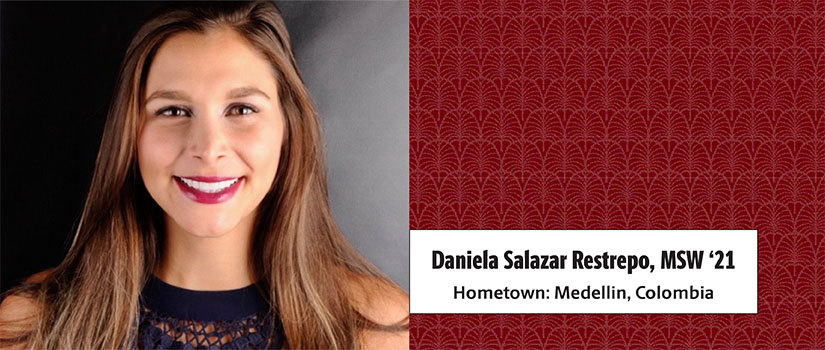When Master of Social Work student Daniela Salazar Restrepo, a native of Medellin, Colombia, attended law school in her home county, one of her professors told her that “attorneys are attorneys; attorneys are not social workers.” It was advice that stuck with her as she immigrated to the United States in 2016.
But her education and experiences in America haven proven that she can be a social worker and lawyer.
“The social work program has the tools I need that didn't allow me to solve problems in my country,” Salazar Restrepo says. “But the knowledge and experiences helped me realize that while attorneys are not social workers, we can be both.”
It was not social work, but law, human rights, and improving her English that were Salazar Restrepo’s priorities after graduating from Universidad de Medellin in Colombia in 2015. She interned in her home country with U.S. Agency for International Development and worked in human rights before wanting to improve her English that would help her continue her career in international law and human rights. She also wanted to work with victims of domestic abuse and these factors led her to immigrate to the U.S.
I can reflect on my experiences when I first came to the U.S. when I needed a mentor and resources to make the right decision.
- Daniela Salazar Restrepo
Salazar Restrepo was accepted to the American University Washington College of Law for advanced studies on human rights and humanitarian laws. She came to the University of South Carolina thanks to a cultural exchange program, which allows exchange visitors to study and work in the U.S. At the time, Salazar Restrepo was seeking a master’s program in law.
“When you apply for the exchange program, your profile allows American families to contact you,” Salazar Restrepo says. “The family I ended up living with reached out to me and talked about the university. My host dad went to the UofSC School of Law and helped me decide that South Carolina was the right place.”
Once in South Carolina, Salazar Restrepo joined the university’s English Program for Internationals. That decision led her to someone who made her realize how social work could be adapted to her future career. Alum Christopher Reid, MSW ’09, who was Salazar Restrepo’s advisor in the International Student Services office, told her about his experiences at the College of Social Work.
“I told him that I was unsure of continuing with law or doing the social work and law dual degree program,” Salazar Restrepo says. “Our conversation helped me realize that there are some consequences that the law itself cannot fix. Law can solve some problems, such as consequences related to poverty or inequality. But social work has the tools to fix issues when it comes to resources and the unintended consequences of law and poverty.”
Salazar Restrepo was still working on improving her English and faced challenges navigating the international student visa process. But she began her path of applying her previous experiences in law and human rights to social work. Some of those experiences led her to choose the social, community and economic development specialization. Her field placements at Mission Lexington (an interfaith social services organization) and Lexington County School District One have helped her understand the different types of systems on how behavior is influenced by a variety of factors and differences in working with clients who struggle to meet their basic needs of food, clothing and housing.
“I saw how different systems were impacting the clients we were helping at Mission Lexington,” Salazar Restrepo says. “I learned about Medicaid, SNAP, and even the impact of the U.S. immigration policy on assisting immigrants and refugees. This helped me cultivate those feelings that I am on the right career path.”
Her current placement at Lexington County School District One has allowed her to work with youth and families facing the consequences of COVID-19. This includes families where one or both parents are unemployed or seeking housing, and how school resources work to fix those problems and help students succeed. As someone who faced her own challenges after immigrating, Salazar Restrepo can relate to some of her clients and how hard work pays off.
“I can reflect on my experiences when I first came to the U.S. when I needed a mentor and resources to make the right decision,” Salazar Restrepo says. “My field experiences now have a purpose because I can look back on my own experiences and know that success is possible.”
Not surprisingly, Salazar Restrepo also has an interest in international social work, especially immigration policy and transnational migration. While taking immigration classes, she realized that continuing to learn about immigration policy and macro (large scale) social work would allow her to help more immigrants and refugees attempt to start a new life or seek safety outside of their home country. She also worked with Colombia native and sociology Assistant Professor Diego F. Leal and helped him analyze data for a migration project: Venezuelan Migration to Bucaramanga, Colombia.
While Salazar Restrepo has a vast array of education and experiences, she desires to work in academia as an immigration policy expert. She considers working at the university’s Sexual Assault and Violence Intervention and Prevention (SAVIP) office and conversations with mentors, specifically Associate Professor Benjamin Roth, as reasons why she wants to pursue work that combines social work, law and immigration.
“I talked with Dr. Roth before starting the MSW program, and I would love to follow his example and be in his position one day,” Salazar Restrepo says. “He has been a great mentor and his experience working with immigrants, especially Hispanics, has been helpful for me.
My experience with SAVIP has helped me realize that I enjoy practicing in the social work and law fields and how I see myself in the future as an advocate and academic in immigration policy.”
